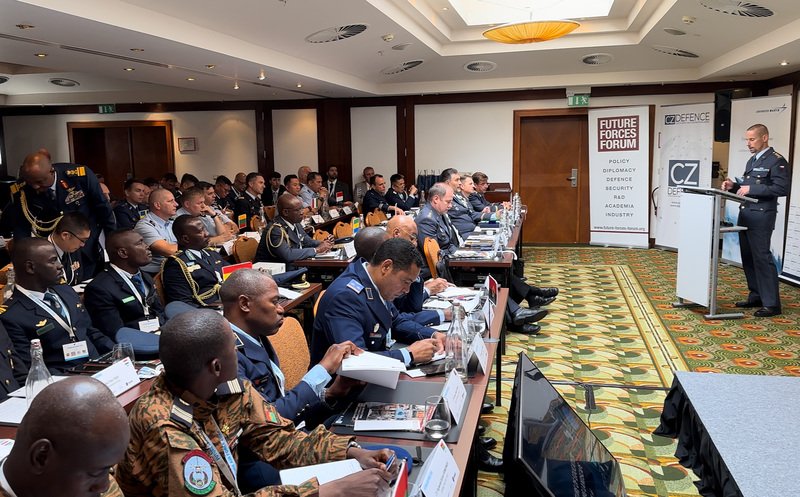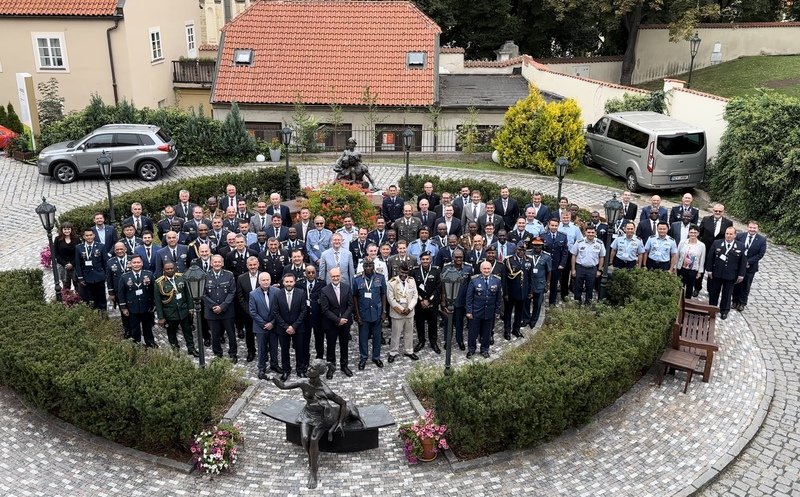The Future Air Force Conference highlighted the challenges in recruiting and training pilots
20.09.2023
The International Conference Future Air Force 2023, organized under the auspices of the Commander of the Czech Air Force, Major General Petr Čepelka, brought together representatives of air forces from 24 countries across four continents to Prague. The main theme of the third installment of the Future Air Force conference series, held within the framework of the FUTURE FORCES FORUM, focused on the challenges and systemic solutions for pilot training in the 21st century.
The two-day program featured a variety of engaging presentations and panel discussions. These sessions explored national approaches and perspectives on the current and future needs for recruiting and training aviation personnel. Other topics included effective ways to involve the industry in training future aviation personnel, new trends in the use of simulation technologies and artificial intelligence elements in training systems, as well as the future possibilities and challenges in modern aviation training, including potential collaborations between different states.

The conference was attended by five Air Force Commanders, including Major General Petr Čepelka, who delivered the opening speech. In the Czech representation, other notable figures such as Brigadier General Jaroslav Míka, Deputy Director of the Defense Development Section, Colonel Michal Kudyn, Chief of the Air Force Training Department, Colonel Miloslav Bauer, Head of the Department of Aviation at the University of Defense, and others also presented.
The international participation was of a high level, with over a hundred delegates, including representatives of air force leaders, training commanders, base commanders, and many other experts from air forces of NATO, EU, Africa, the Middle East, and Asia.
Industry representatives played a crucial role at the conference, particularly in discussions regarding the involvement of the private sector in aviation personnel training. Leading aviation industry companies and training organizations had the unique opportunity to engage in discussions and establish new connections.
Enhancing the effectiveness and efficiency of pilot training can be achieved through the utilization of new technologies, such as simulators and virtual reality. With the advent of new technologies and approaches, it is also necessary to transition to new training curricula.
During the conference, the Director of the Aviation Training Center (CLV) at the LOM PRAHA state enterprise, Jaroslav Špaček, described the history, capabilities, equipment, and future vision of the center. It's worth noting that CLV provides aviation training for virtually all future Czech Air Force pilots studying at the University of Defense in Brno.
Students enter CLV in their second year. Those who aim to become helicopter pilots begin their training directly on Enstrom 480 helicopters. Other students go through training on Z-142 aircraft and then specialize in tactical (continuing their training on L-39s after Z-142) or transport aviation (similarly continuing on L-410s). Some students are also designated for helicopter training. In addition, pilots who already have completed higher education and have civilian aviation qualifications receive training on En-480 helicopters. These are known as "recruits," and after completing the En-480 training course, they are assigned to bases in Prague-Kbely and Náměšť nad Oslavou. CLV also accommodates training for pilots designated for the H-1 system, where they become familiar with the "glass cockpit" and ski landing.
The structure of training for individual students varies depending on the category of pilot they fall into. For pilot students at the University of Defense, they start with the equivalent of a PPL(H) in their first year and continue their training until they reach a total of approximately 150 to 200 flight hours, covering instrument flying, formation flying, terrain landings, tactical flying, night flights, including flights with NVG (night vision goggles), and flights with external loads. For pilots with previous experience on other aircraft types, individual training plans are tailored to their experience. It's worth noting that CLV also provides training for foreign pilots, with dozens having completed training at CLV.

Nearly all the speakers at the conference agreed that it is currently challenging to recruit new pilots and motivate existing ones to stay in their service. Representatives from the air forces of different countries shared possible ways to attract more young people to the profession of military pilots and make it more appealing. One of the reasons for the low recruitment of future military pilots cited was the practical inability to compete with commercial aviation companies, which typically offer better conditions, not just financially. Representatives from the air forces of various countries also agreed on the need for better promotion of military aviation to the public.
The next installment of the Future Air Force Conference is scheduled for October next year in Prague as part of the FUTURE FORCES FORUM 2024 program, which includes an international defense exhibition alongside the conference.
More information is available here.
-
27.01.2026
TENCATE to Exhibit at Future Forces 2026
-
19.01.2026
PILECKY to Exhibit at Future Forces 2026
-
16.01.2026
JD DVOŘAK to Exhibit at Future Forces 2026
-
15.01.2026
Air Force Commander's Ball
-
05.01.2026
INFICON to Exhibit at Future Forces 2026
-
18.12.2025
Season's Greetings
-
15.12.2025
CONCORDIA TEXTILES to Exhibit at Future Forces 2026
-
09.12.2025
ABRIS DG to Exhibit at Future Forces 2026
-
04.12.2025
SPEEL PRAHA to showcase advanced avionics at Future Forces 2026
-
01.12.2025
LOM PRAHA to Exhibit at Future Forces 2026



